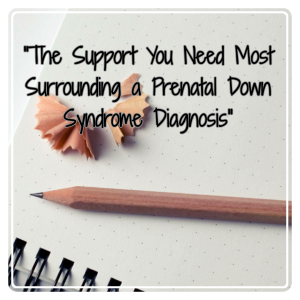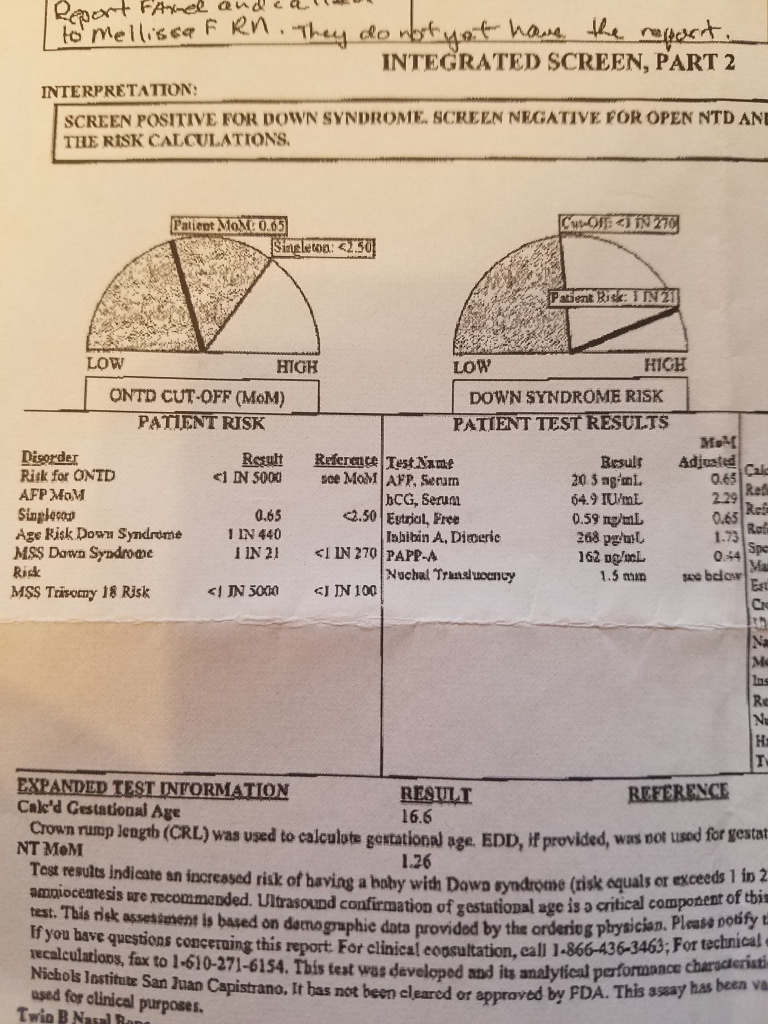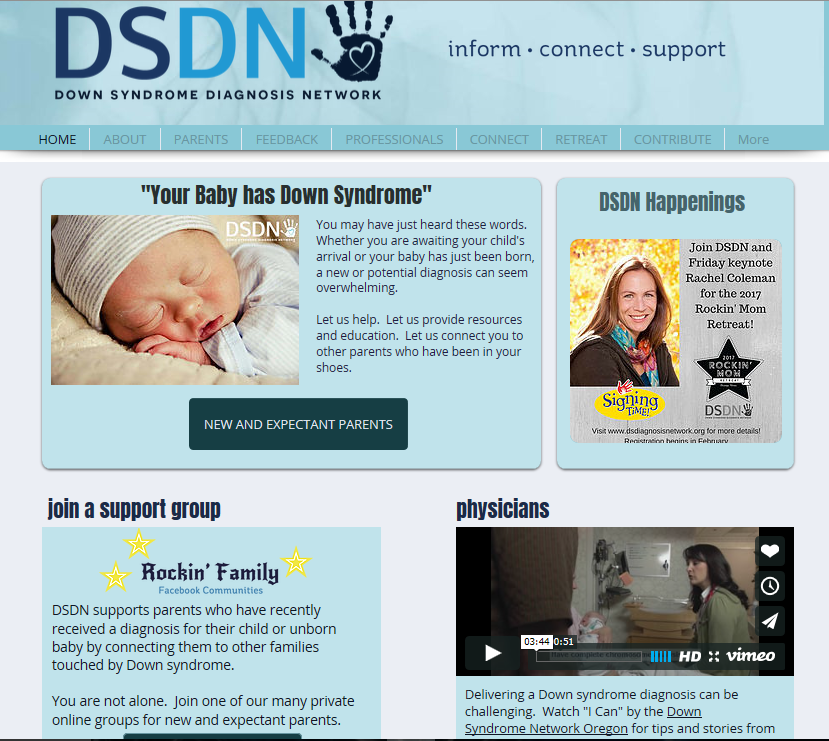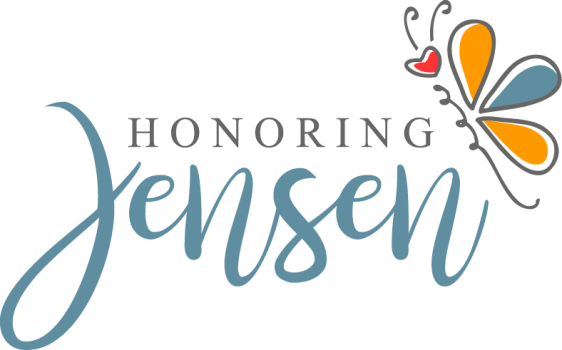 I was 17 weeks pregnant with my first child when I received a call from my doctor’s colleague, Dr. London (my doctor was out of town). He told me very gently that my prenatal quad screening test came back with a 1 in 21 chance that my baby had Down syndrome (Ds), otherwise known as Trisomy 21. It felt like my world had come crashing down. My heart was beating fast and I started to shake. I tried not to let him hear me cry as I listened to what he had to tell me.
I was 17 weeks pregnant with my first child when I received a call from my doctor’s colleague, Dr. London (my doctor was out of town). He told me very gently that my prenatal quad screening test came back with a 1 in 21 chance that my baby had Down syndrome (Ds), otherwise known as Trisomy 21. It felt like my world had come crashing down. My heart was beating fast and I started to shake. I tried not to let him hear me cry as I listened to what he had to tell me.

He told me it was important to note that this was not a diagnosis; this was only a screening test.
A screening test meant that my baby may or may not have Ds. However, my chances were much higher than those my age: 1 in 500 was the typical risk at age 32. Dr. London told me that although the 1 in 21 number seemed scary, to instead look at it this way: there was a 5% chance that my baby boy had Ds. Stated another way, there was a 95%+ chance that he did not.
He talked to me about further testing options available: an amniocentesis or a non-invasive blood test (i.e., cell-free fetal DNA test). He went through the risks and benefits of each test. My head was spinning with all of this information. I feverishly wrote it down on a piece of paper so I wouldn’t forget when explaining it to my husband.
Dr. London reassured me I didn’t have to make a decision right then and there. He was going to put me in touch with a high risk doctor, a maternal-fetal medicine specialist, who would be able to speak with me further about next steps. We were on the phone for about 20 minutes. I don’t know why, but through my tears I told him, “This is my first baby.” And he kindly said, “I know.”
I hurriedly left work while stifling the sobs. I was confused. I wasn’t in the territory of “advanced maternal age.” Why did this have to happen to us? This was my first pregnancy and I was angry and sad that I had to deal with this added anxiety, fear and stress.
- Supportive and Objective Medical Professionals
I will tell you this – – if you have just received a potential prenatal diagnosis or a diagnosis itself and you don’t have a supportive medical professional – – change doctors immediately. You have every right to get the appropriate support during one of the most stressful times of your life. You may always be fearful and upset when you receive the news, but how the doctor handles the initial delivery and your subsequent care will have a dramatic impact on your own mental wellness and ability to cope.
I am forever thankful to Dr. London. He was the first person to break this news to me and he was very kind, patient and compassionate as we talked. He took his time to give me the information and was objective in his delivery. He would stop throughout the conversation and ask me what questions I had for him.
I went on to see several high risk specialists. I was also very fortunate to have had good experiences with every single one of them during my pregnancy. During a time when you are scared and vulnerable, it is key to feel comfortable with your doctors. Not one of them forced any beliefs, judgments or biases on what I should or shouldn’t do. I felt comfortable asking questions when I didn’t understand and they always took the time to provide answers.
They were also honest with me. For example, they were objective and realistic about what health challenges could lie ahead for us (e.g., babies with Ds may have a greater risk for certain medical conditions). But they in no way portrayed it in a negative light nor made me feel like I was foolish for continuing my pregnancy.
I am thankful that I had such a positive experience – others have not.
2. The Collective Knowledge of the Down Syndrome Community
When we learned later on at 20 weeks that the cell-free fetal DNA test came back positive, we were devastated. When I received the news, I cried the full hour on my way home from work and straight into the night. My eyes were inflamed and tired from all of the crying. I didn’t go to work the next two days.
Although it wasn’t a 100% diagnosis, it was a test that had a 99% accuracy rating. So in other words, we were fairly certain our son Jensen had Ds.
Whether you have received news that your baby may have Ds, or whether you were told your baby does have Ds, it can be a lot to process. You may feel scared for your baby, angry at the universe, sad about not having a “typical” child, and unsure about your family’s future. Your mind may be flooded with so many thoughts, questions and fears.
My husband and I found ourselves in this exact position. We came from a place of unknowing and were overwhelmed. Where do we begin to start educating ourselves? We immediately began to seek out resources on national and local Ds organizations’ websites such as the National Down Syndrome Society, the Down Syndrome Guild of Southeast Michigan (our local organization) and the Down Syndrome Diagnosis Network. These websites not only provided great information, but they opened our eyes to the many opportunities our son would have.
We read blogs of other parents who opened up their lives to others by sharing their experience of raising a child with Ds. We quickly began to realize that this wasn’t so scary. Yes, any medical complications were scary, but the Ds alone was not.
These blogs and websites gave us hope.
When I look back, I wish I would have connected sooner with other parents in the Down syndrome community. Honestly, I was afraid to reach out to a stranger. But I have learned that this community is full of the most kind-hearted people I know. They all share a special bond: they fiercely love someone with Ds.
There is so much collective knowledge and support in the Ds community, that if you have just received a diagnosis, or a potential diagnosis, I strongly encourage you to read the information on the National Down Syndrome Society website, make a connection with your local Ds organization and reach out to the Down Syndrome Diagnosis Network (DSDN). The DSDN provides resources and education and connects you with other parents who have been in your shoes.

There is so much power in the collective knowledge and experience of those in the Ds community; take advantage of it.
3. The Love and Support From Your Family and Friends
When we first found out, one of our biggest fears was how others in this world would treat our son. Would he have friends? Would others treat him kindly? We even worried whether our family and friends would love and accept him. Not because there was any indication that they wouldn’t, but because if we had no prior knowledge about Ds, then it was very likely they didn’t either.
Since we can’t control anyone’s behavior but our own, I will speak to the family and friends of someone who received a Ds diagnosis. My words of advice to you are this: Tell your loved one that you love them, you love their baby, and most importantly, nothing will ever change the love you have for their baby. Tell them you will be there for them and will support them all along the way. Say this multiple times. Give them words of encouragement.
When their baby is born, tell them Congratulations. Share in the joy and happiness of this little new life that has entered the world. Ask if you can hold their baby, and shower him or her with love and affection.
We were very fortunate to have an outpouring of support from our family and friends. I remember receiving an email from my sister-in-law the day we told our family, and the first words of the email were: “We love you. We love Andy. We love this baby, our nephew and Jeremy’s cousin. This news could not change any of that.” Tears flowed down my cheeks because I needed to be reassured.
One last thing you can do is to make sure you advocate and spread awareness about Down syndrome. Although we can’t control anyone else’s behavior, we can heighten awareness and teach others kindness and understanding. This starts with each one of us. I’m hopeful that one day in the future, parents don’t have to fear whether their child will have a friend or whether others will treat him or her kindly. I’m hopeful the world will be a place where love and kindness outweigh fear and misunderstanding. Be the change.
Words of Truth
I have to admit, it is hard for me to write about this time period. I am ashamed at myself for feeling “devastated” – but I did feel that way at the time. Since then, I delivered my son at 35 weeks, held his warm, beautiful body in my arms, cuddled him, loved on him, and sadly said goodbye to him 43 hours later. I am forever changed by having this little miracle. He did have Ds – – even though he isn’t here, he has changed my life in a way I never thought possible.
The latest research study showed that 93% of babies with Ds survived to one year of age; unfortunately, my son was part of the 7% that did not. My son had severe heart defects along with other medical complications. The pain of losing him makes absolutely no comparison to the initial sadness of receiving a positive result for Down syndrome.


I admire your determination, courage, and ability to share your story.
LikeLiked by 1 person
Thanks Aunt Elise ❤
LikeLike
Beautifully written Kara!!! ☺
LikeLiked by 1 person